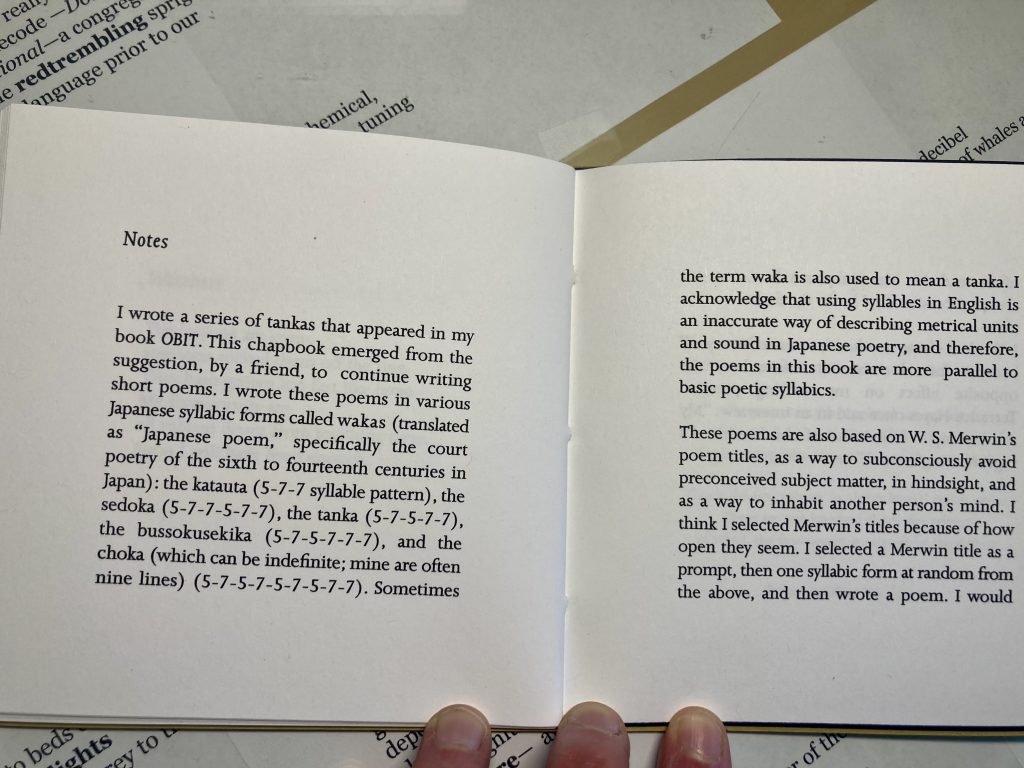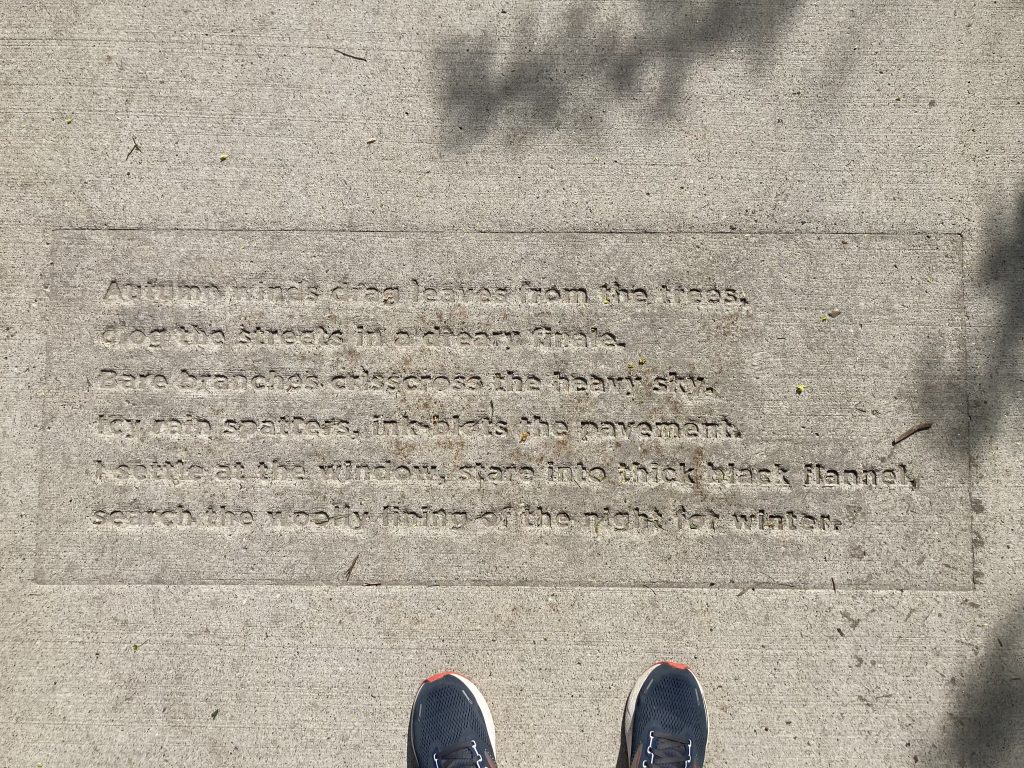4 miles
river road, north/south
73 degrees
humidity: 86% / dew point: 60
A wonderful sunny morning. Not too hot yet, although the humidity took its toll. By the end of the run, I was dripping sweat. Another improved run. Went farther before I stopped for a quick break, then convinced myself to keep going on the way back. Believing again that I can do the marathon in October.
Decided to listen today. Thinking about how delightful it is to move through the neighborhood, passing from sound to sound.
Sounds
- a chorus of BIRD — chattering, chirping, cheeping
- a little toddler voice trying to repeat binoculars after his mom said it in a neighbor’s backyard
- the shshshsh of my feet striking grit on the sidewalk
- overheard from one biker to another — and it was so quiet you could hear the water lapping against the shore
- a male coxswain below instructing rowers
- my house key softly jingling in my pack
- a walker’s keys jangling loudly in his pocket
- whoosh after whoosh after whoosh of car wheels passing on the road
- the buzz on a riding lawn mower — a park working mowing the grass beside the trail
- 2 sets of tap tap tap tapping from roofers — about a dozen taps each, at slightly different speeds, then a short break, then more taps
- the quiet hops of a bunny moving across a neighbor’s grass
- a lawn mower hitting a twig or a root — thwack!
- the clicking of a roller skier’s poles
I think my favorite sound was the soft footsteps of the bunny hurrying across the lawn. A silvery whisper only possible to hear on a calm summer morning like today. I love the sound of animal feet moving — running or hopping through the grass, thundering over hard dirt, scampering in the soft snow.
I posted this poem on here 2 years ago:
Its hot voice sizzles from some cool tree
Near-by:
It seems to burn its way through the air
Like a small, pointed flame of sound
Sharpened on the ecstatic edge of sunbeams.
Speyer is describing a locust but as I wrote on the 16 july 2022, her description makes me think of a brood of cicadas. This sound is LOUD and interrupts you, demanding you notice it. The bunny’s soft footsteps were quiet and easily unnoticed. It feels like an accomplishment to have been quiet and aware enough to hear them.
So, I’m thinking about sound today. Another inspiration: Ears don’t lie.
Hearing is our fastest sense. (Who knew?!) Horowitz says that it takes our brain at least one-quarter of a second to process visual recognition. But sound? You can recognize a sound in 0.05 seconds. And our brain is so adept at hearing the differences between sounds, we can sense changes of sound that occur in “less than a millionth of a second,” according to Horowitz’s book [The Universal Sense: How Hearing Shapes the Mind].
Ears don’t lie
This source led me to a Radiolab story that includes Horowitz: Never Quite Now. This story is not just about sound, but our nerves and neurons and how long it takes for us to process the world. Here’s a helpful description of how our body sees and then wants a pen:
JAD: Okay, so the eye takes the light that’s reflected off the pen, turns it into a little electrical signal, and then sends that deep into the middle of the brain.
CARL ZIMMER: Takes a couple hundredths of a second.
JAD: Bounces around for a bit, and then within …
CARL ZIMMER: A few more hundredths of a second …
JAD: The signal has made it …
CARL ZIMMER: All the way back to the rear end of the brain, where you start processing vision.
JAD: But this is just the beginning.
CARL ZIMMER: Right. Now you’ve gotta like figure out what you’re seeing.
JAD: So our jolt is off again, this time toward the middle of the brain and then down toward the bottom.
CARL ZIMMER: To these other regions ..
JAD: That start to decode the signal.
CARL ZIMMER: The first visual region is called V1.
JAD: Next up …
CARL ZIMMER: V2, V4, and so on. And they’re gonna sharpen the image, make out contrasts, edges.
JAD: And then electricity goes back towards the front of the brain.
CARL ZIMMER: After, let’s see, another tenth of a second or so …
JAD: We finally get to a place where we think …
CARL ZIMMER: “Oh, that’s a pen.”
ROBERT: We haven’t gotten yet to “I want it”.
CARL ZIMMER: Exactly.
JAD: For that to happen, the electricity has to jump from one part of the front of the brain to another and another before you can finally say …
CARL ZIMMER: “That’s a nice pen. I could use a pen.”
JAD: [laughs]
ROBERT: [laughs]
CARL ZIMMER: And we are still not done, you know. Then—then—then …
JAD: Little jolt heads northCARL ZIMMER: To sort of the top of your brain. So we—we’ve gone from your eyes to the back of your brain, around up to the front of your brain again. And now we’re up to the top of your head where you set up motor commands, and then you can grab the pen.
ROBERT: Christ!
JAD: So I mean, you add all this up and what are we talking about here
CARL ZIMMER: About a quarter of a second.
Never Quite Now
Later in the story, Seth Horowitz describes how hearing is the fastest sense and mentions the startle circuit:
SETH HOROWITZ: A sudden loud noise activates a very specialized circuit from your ear to your spinal neurons.
JAD: You mean it bypasses the brain?
SETH HOROWITZ: Yeah, it’s the startle circuit. If you suddenly hear a loud noise, within 50 milliseconds, that’s 50 thousandths of a second, so you’re talking 20 times faster than cognition, your body jumps, will begin the release of adrenaline. No consciousness involved. It’s five neurons, and it takes 50 milliseconds.
Never Quite Now
I’ve written about the word startle before — I especially like Emily Dickinson’s startled grass. There’s a poem in here somewhere, involving bodily recognition (or reaction?) versus brain cognition.
swim: 5 loops
lake nokomis open swim
79 degrees
5 loops! What a great night for swimming in the lake! Calm, goo-free water, strong shoulders, a willing back, enough time to swim an extra loop. Amazing. Writing this a few hours later, I’m wiped out, but I felt good the whole time I was swimming. I swam for 80 minutes without stopping.
I wanted to give attention to sound as I swam, and I did. Mostly, I heard the sloshing of the water as I moved through it. Once I heard a plane roaring above me and another time I heard a lifeguard calling out. Not much else. In past years, I’ve heard squeaks or strange clanging noises, but not tonight. Just slosh slosh slosh.
The water was a pale green with the idea of pale yellow — I didn’t see yellow as much as feel that it was there. Visibility was limited, but I could see my hand in front of me, bubbles, and the underside of the water’s surface, which was very cool.
There were a few menacing swans and some kayaks.
From the shore I could see that the orange buoys were in a straight line. In the water, swimming past them, it didn’t seem as straight. At least once for each loop, I could see the orange dots of the three buoys. The green buoys were more difficult. I didn’t care; I knew where they should be and swam that way.

